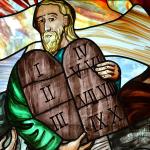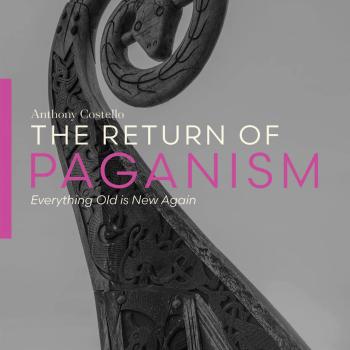I recently came across this short video of the greatest actor alive today, Denzel Washington (okay, perhaps tied with Tom Hanks as the greatest living actor) sharing his testimony about becoming a born-again Christian. Many things impressed me about this interview, which I take as authentic, not least of all because it was a testimony from a very famous movie star. While this was impressive, it is not what impressed me most.
What impressed me most about Denzel’s testimony is something the pastor, A.R. Bernard, says about God leaving upon us an “indelible mark” (17.05). This mark is a personal experience that no matter how much we stray in life we always come back to it. It reminds us of that undeniable event, that unique moment, when we met God face-to-face. I will come back to this idea at the end of the article.
Before that, I want to expound on three other things in Denzel’s testimony that are also important to Christians and that non-Christians might find compelling. These are 1) the role of the biological father in the life of children, 2) the real difficulty that famous, good-looking and talented people have in living out the Christian faith, and living it out openly, and 3) the incredible enthusiasm one experiences shortly after being saved followed by the long, often arduous, process of sanctification. All of these are touched on in the interview.
1. The Role of Fathers
Early Greek thinkers like Xenophanes (570-475 BC) and modern philosophers like Ludwig Feuerbach (1804-1872), argued that the idea of God itself is little more than a projection of far more mundane human relationships. Sigmund Freud did the most to ground this projection theory in the relationship that inheres between biological fathers and their sons. Although Freud’s theory of the origins of religious beliefs has been pretty much debunked by both ethnologists (Kroeber) and philosophers of science (Popper) alike, there is nevertheless much to be said about how the relationship between father and son can affect a person’s concept of God, the Father and Creator.
In the video we hear Denzel speak lovingly about the relationship to his biological father, a “gentle” man (15.06), a “man of God,” who was “saved, sanctified and filled with the Holy Ghost.” Now, we all expect and assume that like any father he was also flawed and committed his share of sin. But, that the father in a child’s life will have an incredible shaping influence on the child, no matter if the father is present or absent, is as close to a psychological fact as can be stated.
That that shaping influence would extend to one’s initial approach or understanding of God is also undeniable. Our spiritual development is not neatly separated from our emotional and intellectual development. We are holistic creatures and what we wrestle with psychologically will have some effect on our relationship with the Divine. And so children of harsh fathers may initially approach God as harsh. Those without fathers may sense God is absent or non-existent and so on. In this limited, subjective sense Freud and Feuerbach were right, our concept of God can be affected by the mundane relationships that shape us emotionally. That this limited, psychological projection has little bearing on God’s actual existence is obvious, but that it affects our relationship with God cannot be casually dismissed.
The Bible itself warns us about projecting onto God in the second commandment given to Moses. Calvin put it even more succinctly when he called the human heart “an idol-making factory.” And Paul, in his letter to the Romans, tells us how the human heart suppresses the knowledge of God and exchanges true knowledge of Him for some aspect of His creation (Romans 1:18-32). That one aspect of creation we exchange God for is our own biological fathers should not be surprising.
The corrective, of course, to any earthly father is God Himself and the Word of God, His biblical Revelation. It is when we encounter Christ and read God’s words about Himself that our concept of God can be reshaped, preserving those influences from our earthly fathers that did reflect God’s character and erasing those which do not.
Paul speaks twice to the role of fathers, when he says that fathers should not stir up anger in their children, but bring them up in the training and instruction of the Lord (Ephesians 6:4) and again that fathers should not exasperate their children, lest they become discouraged (Colossians 3:22). While most of us do not know Denzel personally, it certainly seems that his life displays evidence of growing up with a kind and loving father, one who did not exasperate his child. We should all strive to do the same, even if failure to some degree is inevitable.
2. Fame, Talent and Good Looks Do Not Benefit the Christian Man or Woman
In his classic Mere Christianity, C.S. Lewis points out a serious hindrance to those who might otherwise seek God. This deterrent that prevents some men and women from knowing God are the natural gifts they have been endowed with. Lewis explains:
If everything seems to come simply by signing cheques, you may forget that you are at every moment totally dependent on God. Now quite plainly, natural gifts carry with them a similar danger. If you have sound nerves and intelligence and health and popularity and a good upbringing, you are likely to be quite satisfied with your character as it is. ‘Why drag God into it?’ you may ask. A certain level of good conduct comes fairly easily to you. You are not one of those wretched creatures who are always being tripped up by sex, or dipsomania, or nervousness, or bad temper.
Everyone says you are a nice chap and (between ourselves) you agree with them. You are quite likely to believe that all this niceness is your own doing: and you may easily not feel the need for any better kind of goodness. Often people who have all these natural kinds of goodness cannot be brought to recognise their need for Christ at all until, one day, the natural goodness lets them down and their self-satisfaction is shattered. In other words, it is hard for those who are ‘rich’ in this sense to enter the Kingdom.”
C. S. Lewis. “Mere Christianity.” Apple Books.
The reliance on natural gifts can not only prevent us from coming to Christ, but also hinder our daily reliance on His Holy Spirit once we have. Relying on our own powers and failing to recognize the ultimate source of those powers can stunt our relationship with our Creator and, ultimately, lead us into the first of all sins, the sin of pride.
That the Christian life is fundamentally related to the humility of the soul before God is itself revealed in the life of Christ. Paul talks of God’s “self-emptying” (kenosis) in Philippians 2:5-11:
Have this attitude in yourselves which was also in Christ Jesus, who, as He already existed in the form of God, did not consider equality with God something to be grasped, but emptied Himself by taking the form of a bond-servant and being born in the likeness of men. And being found in appearance as a man, He humbled Himself by becoming obedient to the point of death: death on a cross.
The process of self-emptying so that we can be filled with the Spirit of God and made into new creatures is often easier for those who are naturally wretched and miserable, as opposed to those who seem to have it “all together”:
It is very different for the nasty people—the little, low, timid, warped, thin-blooded, lonely people, or the passionate, sensual, unbalanced people. If they make any attempt at goodness at all, they learn, in double quick time, that they need help. It is Christ or nothing for them. It is taking up the cross and following—or else despair. They are the lost sheep; He came specially to find them. They are (in one very real and terrible sense) the ‘poor’: He blessed them. They are the ‘awful set’ He goes about with—and of course the Pharisees say still, as they said from the first, ‘If there were anything in Christianity those people would not be Christians.
C. S. Lewis. “Mere Christianity.” Apple Books.
That men like Denzel, endowed with incredible natural gifts like charisma and talent, might find it harder to rely on God’s power and providence than say myself should come as no surprise. That he struggled to “want [the Holy Spirit”], didn’t want to “go too deep” and wasn’t “ready to live it” (17.50) is an honest account of what it is often like for those who are gifted by God to not want to acknowledge the source of those gifts, but to rely on them as their own. But, that Denzel is as outspoken a follower of Christ as he is, given his incredible circumstances, is itself a testimony to God’s grace and Denzel’s faithful response to that grace.
For C.S. Lewis, who called himself “the most reluctant convert,” it was not his looks per se, but his natural gift of intellect that prevented him from humbling himself before God. For many of us it may be something other than looks or intellect that hinders us from coming to Christ. But, that some part of our natural gifts may be the very thing keeping us from the Giver of those gifts, is very likely the case.
We dare not forget Jesus’ own words “It is not those that are healthy that need a physician, but those who are sick.” The question of course is whether those who see themselves as healthy will come to realize that unless they acknowledge God’s grace, they will eventually find themselves far worse off than those who are already aware of their illness.
3. Elation and Sanctification, Or “The Law of Undulation”
In the interview Denzel speaks about his being “filled with the Holy Ghost.” This is one aspect of the “indelible mark” that was left upon him and so many of us by God’s Spirit, the third person of the Trinity. Denzel relays how after that experience as a younger man, he was so elated that he felt that “he was in charge of saving people” (19.20). The pastor echoes the same sentiment. It is a spirit of elation that is common to the new believer. I myself felt it for several years and it accompanied me even to some very dark places, like the remote regions of eastern Afghanistan.
However, at some point after the moment of salvation and the accompanying period of elation, the reality of living in a broken and sinful world once again re-establishes itself. It is in this longer period, when the mundane snaps back into place, that theologians have spoken about the enduring process of sanctification slowly transforming the believer. Once the manifest presence of the Holy Spirit begins to recede in the life of the new believer, it can feel as if we are once again on our own, even if we are not.
Spiritual theologians have pondered the phenomena of having “mountaintop” and “valley” experiences during this time. St. John of the Cross famously called the long, dry valleys of the spiritual life “dark nights of the soul.” C.S. Lewis, in another classic on the spiritual life, referred to it as “the law of undulation.” Speaking to Wormwood, the younger demon, Screwtape explains the law,
Their [human beings] nearest approach to constancy, therefore, is undulation—the repeated return to a level from which they repeatedly fall back, a series of troughs and peaks. If you had watched your patient carefully you would have seen this undulation in every department of his life—his interest in his work, his affection for his friends, his physical appetites, all go up and down. As long as he lives on earth periods of emotional and bodily richness and liveliness will alternate with periods of numbness and poverty. The dryness and dullness through which your patient [the Christian man] is now going are not, as you fondly suppose, your workmanship; they are merely a natural phenomenon which will do us no good unless you make a good use of it.
“The Screwtape Letters.” Apple Books.
In spite of this natural undulation, those trained in the spiritual disciplines also speak about God’s consolation. God’s consoling presence, which is given commensurate to the level, kind or degree of sin that the former non-believer was engaged in prior to their conversion. For men or women who were involved in great works of evil or iniquity, either in the literal worshiping of false gods, or in deeply perverted or violent acts, God will always meet these souls with tremendous manifestations of His power, His forgiveness and His love.
It is no wonder, then, that so many of God’s greatest saints, like Paul himself, were quite wicked and cruel people prior to their conversion. For those who were involved in great evils, or who have had great evils done to them, this period of consolation and elation is often long and vibrant. As Christ himself said to the Pharisee, Simon, after forgiving the women who had sinned much: those who have had a large debt forgiven love much, while those whose debts were small, love little (Luke 7:40-50).
Nevertheless, at some point in everyone’s journey, the period of elation and consolation will gradually abate and the Christian will enter into the dry valley of spiritual and moral maturation. What is important for all believers to realize is that it is specifically in these times, during these “troughs” as Lewis puts it, that God does His most profound work. For it is in the moments when it feels as if the river of life has run dry that God is perfecting the faith of His people.
Denzel hints at this process throughout the interview, when he speaks about how life does not “go as it should” (19.10) even after one has directly experienced the power and presence of the Holy Spirit. But it is exactly in those times when life does not go as it should that we truly learn what it means to be the new creations, the new men and women, that God has called us to be. James, the half-brother of Jesus tells us that a faith untested is not a genuine faith:
Consider it all joy, my brothers and sisters, when you encounter various trials, 3 knowing that the testing of your faith produces endurance. 4 And let endurance have its perfect result, so that you may be perfect and complete, lacking in nothing.
James 1:2-4
4. The Indelible Mark
Finally, we come back to the “indelible mark” (17.05) that Pastor Bernard refers to in the interview. Those of us who have been “born again” know this mark well, for it is an experience of God that is more real than any other reality we have ever experienced. In Denzel’s case he felt like he was “going up in the air” (16.45) and “his cheeks were filled” with the power of God (purging the devil from his soul, apparently). The pastor is correct in pointing out that it is this experience that, no matter how much we stray during the times of undulation, God will never let us forget that moment we met Him personally.
This experience can be different in some ways for different people. However, there are also similarities, shared features of religious experience. The early 20th-century Lutheran theologian, Rudolph Otto, described these shared features of religious experience as an experience of the mysterium tremendum et fascinans, a sense of overwhelming mystery in the presence of a great being that makes us feel small, insignificant and humble on the one hand, while also filling us with joy, peace and an incredible desire for adoration on the other. Analytic philosophers like Richard Swinburne, Alvin Plantinga and William Alston have formulated arguments that show religious experiences lend epistemic weight to religious belief.
When it comes to the descriptive, the Bible also gives us glimpses of how others in the history of God’s people have experienced the kavod, or manifest presence of God. The most revealing example is Isaiah’s encounter of God in the temple:
In the year of King Uzziah’s death I saw the Lord sitting on a throne, lofty and exalted, with the train of His robe filling the temple. 2 Seraphim were standing above Him, each having six wings: with two each covered his face, and with two each covered his feet, and with two each flew. 3 And one called out to another and said,
“Holy, Holy, Holy, is the Lord of armies.
The whole earth is full of His glory.”4 And the foundations of the thresholds trembled at the voice of him who called out, while the temple was filling with smoke. 5 Then I said,
“Woe to me, for I am ruined!
Because I am a man of unclean lips,
And I live among a people of unclean lips;
For my eyes have seen the King, the Lord of armies.”Then one of the seraphim flew to me with a burning coal in his hand, which he had taken from the altar with tongs. 7 He touched my mouth with it and said, “Behold, this has touched your lips; and your guilt is taken away and atonement is made for your sin.”
Simon Peter and the other apostles, upon witnessing the glory of God in Christ through a miraculous work, also experienced (for the first but certainly not last time), the mysterium
But when Simon Peter saw this, he fell down at Jesus’ knees, saying, “Go away from me, Lord, for I am a sinful man!” For amazement had seized him and all his companions because of the catch of fish which they had taken; and likewise also were James and John, sons of Zebedee, who were partners with Simon. And Jesus said to Simon, “Do not fear; from now on you will be catching people.” When they had brought their boats to land, they left everything and followed Him.
Luke 5:8-11
Conclusion: Thank God For His Indelible Mark
I too have an indelible mark. I am by no means a Denzel Washington, but to God what does that matter. God is no respecter of persons. Men and women and children from every culture, from every race and class and from every nation throughout time and space will have the indelible mark. All kinds from all nations or as the Bible says from “every tribe and every tongue.”
How tremendous is it not only to know that God will leave His mark on us in such a way that, as pastor Bernard says, no matter how far we stray or wander, we never forget “the power of that moment” (17.20) One good reason to think that we never forget that moment, is because it was indeed the moment that we met Jesus Christ by the power of the Holy Spirit. It was the moment we saw God and knew not only that He is real, but that He is for us and not against us, should we accept Him.
I received that indelible mark in March of 2010 at the age of 34 while serving in the Army. Like Denzel and like Isaiah and Peter and the other Apostles, I was overcome with both fear and awe and then a tremendous, indescribable sense of God’s powerful love, mercy and forgiveness. And then I saw Him, Jesus Christ, the crucified one, the Resurrected Son.
Oh, how great and wonderful is that indelible mark of God, that mark that marks us as His own! And how wonderful it is to know that I too, like Denzel and John Doe and Mary Sue, will go marching in with the saints, that I too will be in that number (32.20). For those who have not yet experienced the mark of God, fear not, for God has told you already that if you seek Him, you shall indeed find Him.
Nota Bene: In referencing this video and testimony I am not saying I agree with all of (or even know much about) Denzel’s or Pastor Bernard’s theological beliefs. I only know that what they both share here about God giving us undeniable experiences of His presence is true. Beyond that I neither endorse nor reject other theological commitments they may hold.
Photo: Georges Biard, CC BY-SA 3.0 <https://creativecommons.org/licenses/by-sa/3.0>, via Wikimedia Commons














